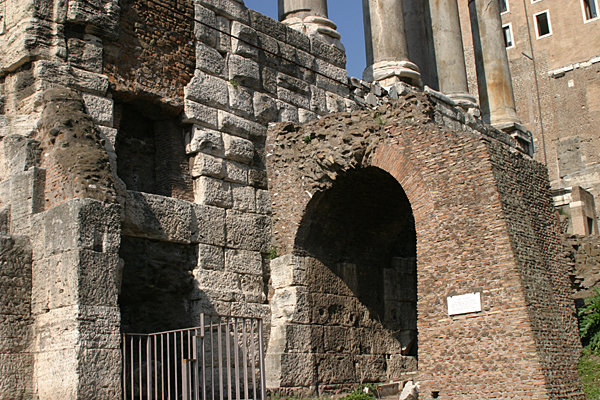

Arranged beneath the high podium of the Temple, the Aerarium Populi Romani was the repository for documents of State and its treasury of bronze, silver, and gold. It also contained a special reserve (aerarium sanctius) into which was paid the five percent tax on the emancipation of slaves.
During the civil war with Pompey, Julius Caesar seized this reserve in 49 BC for his own use. Plutarch, in his Life of Caesar, relates that, when the keys to the treasury could not be found, Caesar had the doors broken down. The tribune protested. "Caesar then raised his voice and threatened to kill him if he did not stop interfering. 'And, young man,' he said, 'you know well enough that I dislike saying this more than I would dislike doing it.'" He then proceeded to remove fifteen thousand bars of gold, thirty thousand bars of silver, and fifty million sesterces of coined money.
Plutarch, in his Roman Questions (XLII), asks "Why do they use the temple of Saturn as the public treasury and also as a place of storage for records of contracts?" Was it because, in the golden age of Saturn, "there was no greed or injustice among men, but good faith and justice," or that the god was "the discoverer of crops and the pioneer in husbandry" and an abundant harvest allowed buying and selling and so initiated a monetary system? "Or is this a matter of ancient history, and was Valerius Publicola the first to make the temple of Saturn the treasury, when the kings had been overthrown, because he believed that the place was well-protected, in plain sight, and hard to attack secretly?"
Plutarch elaborates in his Life of Publicola,
"He also received praise for his law concerning the public treasury. When it was necessary for the citizens to contribute from their substance means for carrying on the war, he was unwilling to assume the administration of it himself, or to allow his friends to do so, or, indeed, to have the public moneys brought into any private house. He therefore made the temple of Saturn a treasury, as it is to this day, and gave the people the privilege of appointing two young men as quaestors, or treasurers" (XII.2).